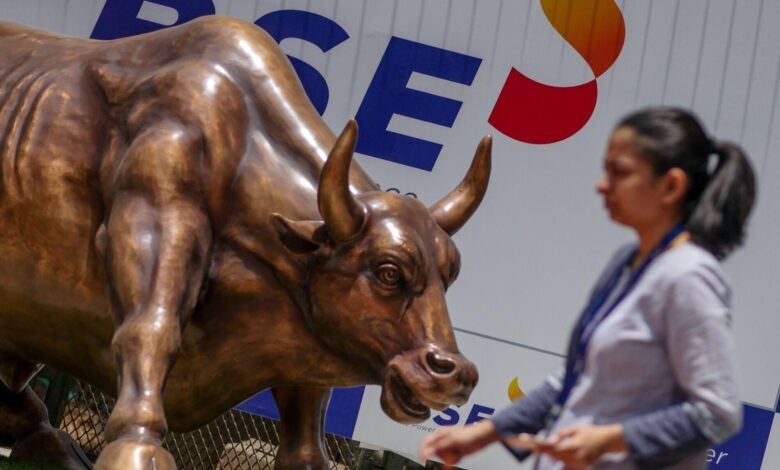Indian stocks lose US$386 billion as polls tighter than forecast

India’s stocks market plummeted, erasing US$386 billion in market value, as tallies showed that Prime Minister Narendra Modi’s ruling party did not win a majority of seats in national elections, a stunning result after exit polls showed he was on pace for a landslide victory.
Commentators and exit polls had projected an overwhelming victory for Modi, whose campaign wooed the Hindu majority to the worry of the country’s 200-million-plus Muslim community, deepening concerns over minority rights.
But for the first time in a decade Modi’s Bharatiya Janata Party (BJP) failed to secure an overall majority of its own, figures from the election commission showed, meaning it would need to rely on its alliance partners.
With nearly 99 per cent of votes counted, the BJP’s vote share at 36.7 per cent was marginally lower than it was in the last polls in 2019.
India has placed its faith in the ruling coalition “for a third consecutive time”, Modi wrote on social media platform X, referring to the BJP and its allies.
“We will continue the good work done in the last decade to keep fulfilling the aspirations of people.”
GET BT IN YOUR INBOX DAILY

Start and end each day with the latest news stories and analyses delivered straight to your inbox.
The NSE Nifty 50 Index tumbled 5.9 per cent in Mumbai, its worst day in more than four years, as counts showed Modi’s Bharatiya Janata Party and its allies in the National Democratic Alliance were leading in more than 290 seats, slightly more than 272 needed for a majority in parliament and well short of the roughly 350 they won in 2019. The rupee fell the most in a year and the 10-year yield rose.
A narrower-than-expected victory for Modi’s alliance will raise questions about the new government’s ability to push through politically difficult reforms in land and labour laws – seen as crucial by some investors to sustain India’s economic growth, already the world’s fastest. Before voting kicked off on April 19, Modi had boldly predicted that his alliance would win a whopping 400 seats.
“As BJP does not have a simple majority, the bargaining power shifts materially within the alliance,” Sunil Tirumalai, strategist at UBS Group, wrote in a note. “Most scenarios from here could be taken negatively by the market compared with expectations last week.”
More than 20 opposition parties, spearheaded by Rahul Gandhi, formed a united front called the Indian National Developmental Inclusive Alliance in a bid to defeat Modi. A mixture of regional and caste-based groups, the alliance focused on appealing to voters who felt left out of India’s growth story, which has been marked by growing inequality, pervasive joblessness, rising living costs and growing demand for welfare support. It was on course to win more than 180 seats.
Businesses linked to the government’s development goals tumbled, with Adani Ports & Special Economic Zone taking a nosedive. The yield on the 10-year bond rose eight basis points to 7.03 per cent, the biggest jump since October.
The Nifty tumbled as much as 8.5 per cent at one point, coming close to hitting its first circuit limit since Covid-era crash in March 2020. The selloff had echoes from the 2004 elections when the BJP’s unexpected defeat triggered a market crash. Trading was suspended twice when the S&P BSE Sensex fell more than the 10 per cent limit, the first time in the exchange’s history.
The rout eroded the combined market value of BSE-listed companies by US$386 billion to US$4.73 trillion, according to data available on the exchange’s website.
Volatility spiked with a gauge of 30-day ahead implied swings on the NSE rising the most in two years. An index of so-called Modi stocks, as termed by CLSA, slumped, with Adani Group’s flagship unit Adani Enterprises among the biggest decliners.
“We were against a lot of cynicism,” said Salman Khurshid, speaking to deKoder, an online news channel. “Our own reading on the ground was that something like this will happen or something better than this will happen.”
While the BJP-led alliance is still set to win a third term, Modi will now be more beholden on coalition partners for support – including two regional party leaders who have frequently switched allegiances in the past. One of them – Nitish Kumar, chief minister of northern Bihar state and leader of the Janata Dal (United) – had been a member of the opposition alliance when it first formed last year before defecting. The other is N Chandrababu Naidu from southern Andhra Pradesh state, who has also worked with various coalitions.
Nonetheless, investors are banking on continuity in the government’s infrastructure and manufacture-led drive to boost growth.
“I still think the policy direction of Modi will likely stay, which should support India’s economy in the longer term,” said Dong Chen, chief Asia strategist at Banque Pictet. “The valuations are expensive but we will be watching for any correction closely as it may create some entry opportunities.”
Modi had touted his administration’s efforts on boosting capital formation, which has partly helped India’s economy stay among the fastest growing in the world.
“Indian markets were trading at 140 per cent market cap-to-GDP,” said Sameer Kalra, founder of Target Investing, referring to the expensive equity valuations. “If there is some uncertainty in future policy moves there can be a major correction.” BLOOMBERG, AFP

